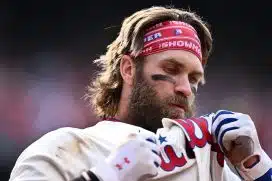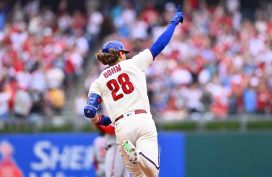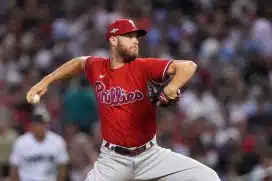By Tim Kelly, Sports Talk Philly editor
Count me among the many who analyze the Philadelphia Phillies who think Vince Velasquez may be best suited to be a late-inning reliever eventually. I don't, however, think April 2017 is the time for the Phillies to make that transition with the 24-year-old.
While Velasquez's 9.00 ERA through his first two starts of 2017 is alarming, it has only been two starts. In the same way that many jumped to conclusions when he had a 2-0 record with 25 strikeouts and a 0.00 ERA through two starts in 2016, the Phillies can't make long-term organizational decisions based off of two starts.
Velasquez's future may not be in the starting rotation, but 2017 remains a rebuilding year and the Phillies should be absolutely sure that he's not cut out to be a starter before moving him out of the rotation.
Trending: Stop saying you won't root for Bryce Harper if he ends up on the Phillies
For starters, he seems more invested in being a starter pitcher. For as bad as his first two starts have been, he seems to understand what he's doing wrong — working deep counts, not pitching to contact enough — and is invested in fixing it. He's talked in the past of his desire to be a No. 1 starter. And on top of all of that, Velasquez made clear when the Phillies acquired him that he preferred to be a starter as opposed to a reliever.
That's not to say that Velasquez has enough organizational pull to keep the Phillies from eventually trying him as a reliever, because he doesn't. But for as many flaws as he's shown in his first 26 starts with the Phillies, he's shown enough potential promise to continue to examine him as a starter.
For as many talented young pitchers as the Phillies have in their organization, they do seem to lack front of the rotation starters. Zach Eflin, Ben Lively and Jake Thompson are nice pieces, but they seem to project as back-end starters on a good team, as opposed to an potential aces. Some of the starters with ace-type stuff — Franklin Kilome, Sixto Sanchez — are years away from the majors and certainly are not sure things. Jerad Eickhoff is a very good middle of the rotation piece for a contender. Aaron Nola probably has the upside of a No. 2 starter, but health questions and him inconsistency displaying elite control make you wonder if he will realize that potential.
As we've seen in some of his poorer starts, Velasquez has a lower floor as a starter than Nola and Eickhoff. His potentially elite fastball, and the hope that he will continue to develop his secondary pitches, do give him perhaps the highest ceiling of any starting pitcher in the upper levels of the organization, however. If the Phillies could develop a top-end starter as opposed to having to buy and/or trade for one (or two), that would be ideal.
Popular: The Phillies were the most profitable MLB team in 2016
Innings wise, especially with someone who has the health history of Velasquez, it would be very difficult to ever try Velasquez as a starter again if the Phillies did move him to the bullpen for an extended period. Last year, the Phillies had to limit Velasquez to 131 innings because he had been limited to 88.2 in 2015 when he was in the Houston Astros organization, largely because they used him as a reliever late in the season. Velasquez said in Spring Training this year that he expected his innings to be 'monitored' this year.
In other words, transitioning someone from a reliever to a starter is a two or three year process, if all goes well. So if the Phillies do eventually move Velasquez to the bullpen, there won't be much room for going back.
As mentioned in the open to the article, Velasquez is still just 24 and he's under team control through the 2021 season. He may eventually end up in the bullpen, but starting pitching is a much bigger need for the Phillies, so they would be wise to at least ride out the 2017 season with him starting.







